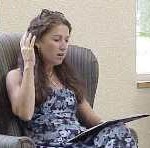Carrie Hessler-Radelet: The Volunteer who Stayed
[Kitty Thuermer (Mali 1977-79) attended the Peace Corps Acting Director’s talk at the National Press Club last week and was kind enough to send me her impressions of Carrie Hessler-Radelet and the presentation by the Peace Corps.]
•
How fitting that Carrie Hessler-Radelet, Acting Peace Corps Director, spoke in the Edward R. Murrow room at the National Press Club in Washington D.C. on February 27th.
Imagine CBS News broadcaster Edward R. Murrow, tall, lanky and cranky — the man whose voice signaled hope to a generation of World War II fighters — imagine him as a Peace Corps Volunteer. Sporting a bush jacket, head wreathed in a cloud of cigarette smoke, he would be just the guy to help launch a community radio program in rural South America.

Kitty Thuermer (Mali 1977-79) at the 1999 NPCA Conference reading her humorous article “Why I Stalk,” published in The Washington Post
Murrow would also be the first to embrace new technology and wrestle it into service in the field. Which is exactly what the current generation of Volunteers is doing — as exemplified by the newly returned PCV from Nicaragua, who introduced Carrie Hessler-Radelet.
The young RPCV, Lauren, Carrie was proud to note, is at the forefront of the international communications revolution — fueled by mobile technology — that has enabled access and equity to people in places no longer off the grid.
“As we speak,” Carrie noted, “PCVs are helping farmers in Kenya use mobile technology to connect with markets; partnering with the private sector to hold business plan competitions for youth in the Dominican Republic; promoting improved agricultural practices using podcasts in Senegal . . . and, as we just heard from Lauren — designing text messaging platforms to help high school students in Nicaragua learn about reproductive health.”
Carrie Hessler-Radelet is a Volunteer’s Volunteer. She is real folk. Her own passion for public health service was forged through her Peace Corps experience in Western Samoa, which, when she signed up, she “didn’t know would transform my life.”
As Acting Peace Corps Director, she has remained humble, while traveling the globe representing us in navigating the complexities of the 21st century.
As Peace Corps has come of age, Carrie made the point that in the early days, Peace Corps was the only game in town — whereas now there is an explosion of international opportunities and partnerships — in part inspired by Peace Corps’ success.
That twenty countries have come knocking at Peace Corps’ door is a testament to its continued relevance. And its value was reinforced to Carrie when she met with Guinea President Alpha Conde when he was paying a visit to the White House last year.
His story is worth recounting:
I want to tell you how Peace Corps has transformed my life, but more importantly, how it has changed the lives of my people.
I had a Peace Corps Volunteer teacher who was the first person I can remember who believe I had a future outside the boundaries of my village. He was an agroforestry Volunteers, who every night opened up his house to students for homework help. He helped me with my math, my science, my English and my French.
When it came time to take my national exams, I passed. I was one of four people that year who qualified for university. I am certain I would not be President today if not for his support and encouragement. And he is a lifelong friend to this day.
But even more important than his impact on my life — which is profound — is the impact of your Volunteers on my people. During the course of my six month campaign for the presidency, I visited over 300 villages in Guinea. I went to villages in the far east of my country where my own campaign staff would not go, and there were Peace Corps Volunteers there. I went to villages in the center of the country, visited by NGOs who come to drop off bags of rice or cement or to do a training — and they do good work. Yet at the end of the day, they get back into their big white SUVs and drive back to the capital. But your Volunteers — they stay.
Yes, they do stay. I was particularly moved by President Conde’s story because my own Peace Corps/Mali site mate, Harriet Gaines, after finishing a third year of service, postponed going to graduate school so she could take a public health job in northern Guinea — which was then newly opened up to outsiders. Sadly, Harriet died in a car accident, but I know she would have been proud of the work of a generation of Volunteers in Guinea, as testified by President Conde.
Carrie Hessler-Radelet, by her own admission, has plenty of work to do. But under her leadership, the Agency has come a long way in streamlining operations, engaging in new programs, using technology in creative ways to serve the field, and home office.
Her passion remains laser focused on the Volunteers and their partners in the field. Once again, President Conde was right. “Your Volunteers — they stay.”
Carrie Hessler-Radelet has stayed.
•
Kitty Thuermer (Mali 1977-79) grew up in India (Fast Times at Hindi High), Ghana and Germany, and has worked in Madagascar, Tanzania and Rwanda. She is a consultant in Washington, DC, always looking for the next ticket outta here.
No comments yet.
Add your comment